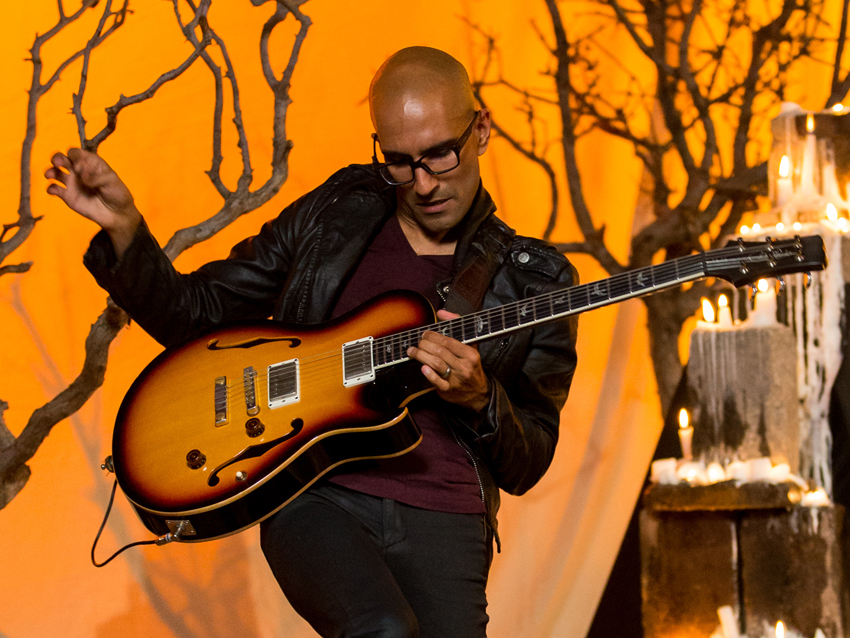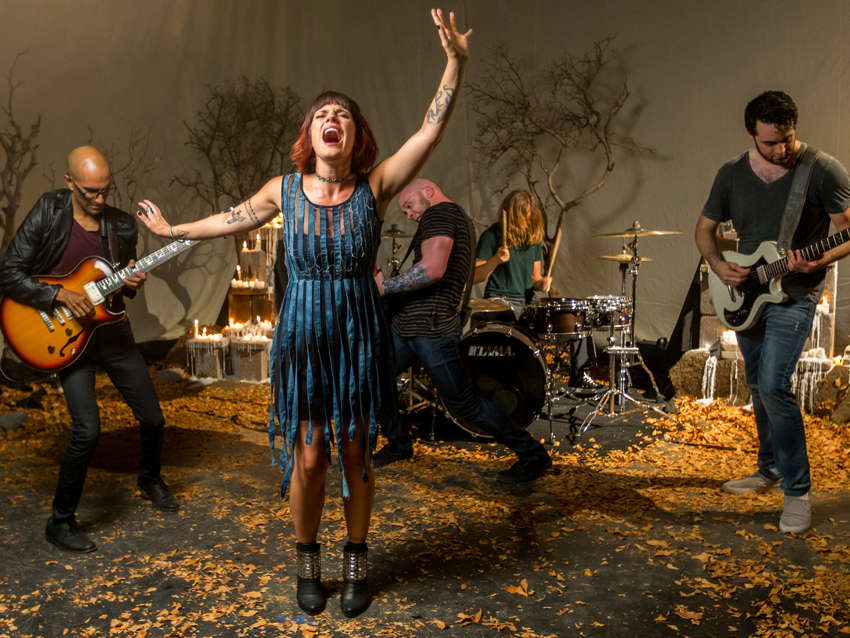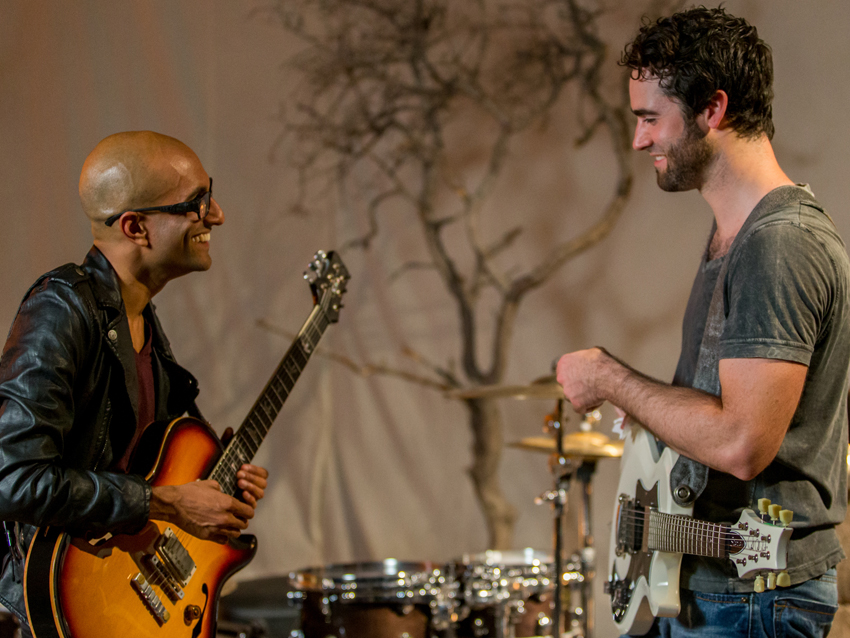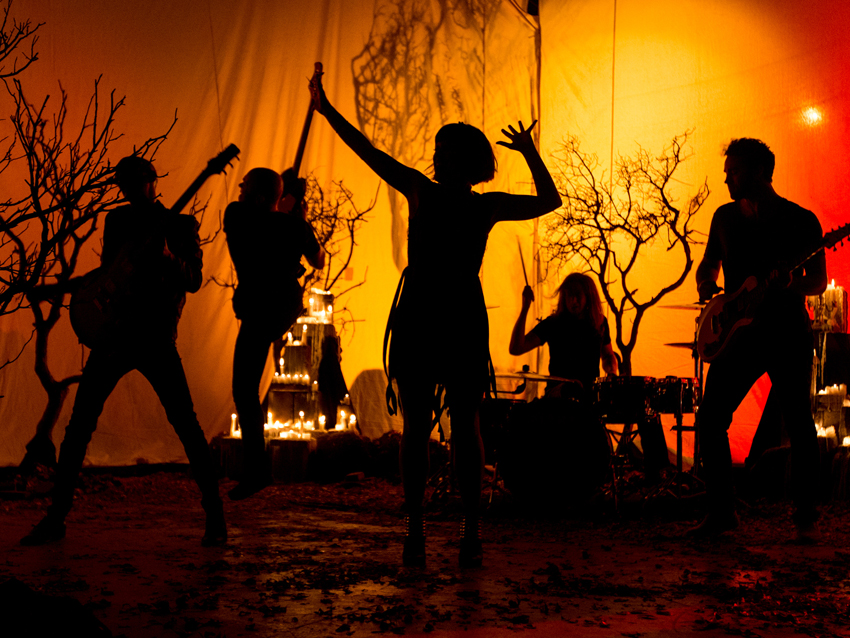
Flyleaf's Sameer Bhattacharya on Don Gilmore and new album Between The Stars
Changing lead singers is a risky proposition for any band, and it's a situation that Flyleaf faced in 2012 when vocalist Lacey Sturm announced her decision to quit the Texas-based hard rock outfit she had helped form 10 years earlier.
"All of those things that could have gone through our heads at first definitely did," says guitarist Sameer Bhattacharya. "We were like, ‘Are we over? Are we going to have to start the band again from scratch?’ I remember when I got the news that Lacey was leaving, I was saying to myself, ‘Man… I should’ve finished college!’ [Laughs] It was a weird time. We were feeling a lot of anxiety."
The band's stress was quickly eased with the addition of former Vedera singer Kristen May, who made her recording debut with Flyleaf on the 2013 single Something Better, which was quickly followed by an EP, Who We Are. And today (Sept. 16), May and the rest of the band (which also includes guitarist Jared Hartmann, bassist Pat Seals and drummer James Culpepper) are releasing the album Between The Stars, a tighter, harder-edged but surprisingly more hook-driven effort than their past three full-length efforts. May isn't the only change-up on Between The Stars: producer Don Gilmore, known for his work with bands such as Korn, Linkin Park and Good Charlotte) sat in the producer's chair heretofore occupied by Howard Benson.
Bhattacharya talked to MusicRadar recently about working with Gilmore, whether the band feels different with their new front person, playing with co-guitarist Hartmann, and how he's come to appreciate classic '60s axe heroes. (Flyleaf's Between The Stars is available at iTunes, Amazon and Google Play.)
Making any record is, I'm sure, a learning experience. How was this one different from the records you made with Howard Benson?
“This is a more uninhibited record for us. It's full of spontaneity. Don calls it “capturing the magic,” and that’s what it really is. Before, we were so obsessed with details and getting what we thought were perfect takes and perfect sounds, but Don was like, ‘Chill out. We’re not capturing perfection; we’re capturing magic.’ That was a new thing for us – letting go.
“If there was a mistake or if something was a little offbeat in a take, a lot of times, Don would say, ‘That’s the one. There’s something in that performance I like.’ That was hard for us to get our heads around at first.”
On working with producer Don Gilmore: "I’d go in and make a bunch of noises, and he would say, ‘Yep, that’ll work!’"
At what point did you get more comfortable with what he wanted from you?
“I don’t think it was until we got the master tracks back. [Laughs] I was pretty nervous the whole time, actually. I’m still so used to Howard Benson’s approach. He would go in with a plan: how we’re gonna track things, how everything was gonna sound, what kinds of programming he’d use. He put a lot of programming on things; you might not notice it, but it was there. He worked it all out beforehand.
“Don was very laid-back: ‘Hey man, let’s just throw it against the wall and see what sticks.’ And I guess that comes out of trust – he trusted that we’d come up with good stuff. Like I said, it was new territory for us to explore.”
What exactly made you want to work with Don? Did you just feel that you had done as much as you could do with Howard?
“Howard is a phenomenal producer, and if we would’ve gone back to him, it wouldn’t have been the wrong choice. For me, the main thing was that I wanted a set of fresh ears. Plus, I didn’t want the new record with Kristen to be compared with the old records, which it would have been if we did it with Howard. It was important to work with somebody who never did anything with us before; that way, nobody was locked in the past.”
As a guitarist, what was working with Don like? I have to imagine things were a little different there, too.
“He really embraced what I do – and what I do with Jared. Don and I have similar tastes, and he’s a guitar player himself, so things went very easy with him on that front. I’d go in and make a bunch of noises, and he would say, ‘Yep, that’ll work!’ [Laughs] He didn’t make me fuss over things.”

Continuing as a band
Above photo: Flyleaf (from left) Sameer Bhattacharya, Kristen May, Pat Seals, James Culpepper and Jared Hartmann
I’m curious as to how Kristen came into the fold. Had your paths crossed before? Were you familiar with her old band, Vedera?
“We were familiar with her old band, but no, we’d never crossed paths. We had compiled a list of some of our favorite singers, and Kristen was on there, but we thought that the band was still together, so we took her of the list. [Laughs] We went through the list and found some singers, particularly this one who was living abroad. We contacted her booking agent and said that we were interested in her – could he help to organize a meeting? He said, ‘Yeah, I could, but I have this other girl who’s Stateside, Kristen May from Vedera…’
“We were like, ‘That’s awesome!’ So we hooked up through the booking agent. She came down to Central Texas, and from that first meeting it was love at first sight.”
We talked about how nervous the band felt with Lacey leaving. It is a big deal when there's a change in singers. People project the identity of the band onto that lead singer.
“Absolutely. I think Flyleaf have always been evolving. Every record is different from the previous one. I mean, we’ve grown up so much since we started, when we were teenagers – we’re in our 30s now. We’ve changed a lot, and that would’ve happened if there were new members or not. Sure, we are a different band, but ultimately we’re still Flyleaf, if that makes any sense.” [Laughs]
“When we found out Lacey was leaving, we got together, the four guys, and we asked ourselves, ‘OK, do we wanna keep doing this?’ And we all said yes. We still believed in the vision of our band, that we had a message of hope and love; that’s something we wanted to keep on sharing. We never lost that drive.
“We talked about getting another singer, but did that mean we should change our name? We talked about whether we wanted another female front person, or did we want to get a male singer this time? All of those things. We went through all the scenarios, with tears and laughs and the whole thing.”

On co-guitarist Jared Hartmann
I read an interview you did recently, and I know you weren’t knocking Lacey, but you were saying how Kristen’s range is more soaring and melodic, and how it changed the songs you’re able to do.
“Yeah, it did. Obviously, Kristen is a different person with a different approach, so there are some things that wouldn’t have happened without her, that’s for sure. We thought about bringing up some older songs that we didn’t do with Lacey – ‘What would they sound like with Kristen?’ But the new writing sessions were so good, the new songs were so fresh, so we didn’t revert to the old stuff. Everything on the record is new.”
Has anything changed with how you and Jared work out your parts?
“You know, it’s a funny thing. This is something Jared’s wife noticed years ago: Whenever he and I are working out our parts, we never talk. We don’t say, ‘I’m gonna do this, so why don’t you do that?’ None of that. He’ll start ripping on something, and I’ll just wrap notes around it, or vice versa. I’ve never played with anybody else, really – nothing serious. So Jared and I have this unspoken way of communicating through guitars. Actually, we learned how to play video games before guitars. [Laughs] I think we just know what to do instinctively. Without even talking, we can write an entire song.”
So what can Jared do on the guitar that you can’t, and vice versa?
“Jared can do everything that I can. [Laughs] He’s got a really fast, right wrist. When it comes fast metal stuff, he’s like a metronome. And the tone from his fingers is a lot thicker than mine. I can jump on his gear and play the exact same thing that he just played, but it won’t sound anything like him. He gets it from his hands, that big fat tone. Maybe he has harder calluses or something. [Laughs]
“I’m a little more chaotic and melodic, I think. It gives me a little freedom as far as timing and tuning goes. Jared is more like the meat and potatoes, and I’m like the sage and rosemary on top.” [Laughs]
So if you were a comedy team, he’d be the straight man.
“Yeah – only he’s funnier than me, too.” [Laughs]
You guys are still using PRS guitars?
“Yeah. I’m using a JA-15 as my main guitar. It’s just a really great guitar all around. The tone, the playability – I can’t say enough about it.”

On British axe greats
Don Gilmore must have a lot of guitars. Did you use any of his instruments in the studio?
“I don’t think I used anything of Don’s, but the place where we recorded, at this home studio owned by this guy Jordan, he had a bunch of awesome vintage guitars. We really took advantage of those. Don brought a lot of amps – that was cool. But mainly, we stuck with the Orange amps, the 50-watters, and Tone Kitchen amps.”
I read an interview with you recently in which you talked about some of your guitar influences. They were all pretty recent – bands like Rage Against The Machine and Jimmy Eat World. Do you dip back further sometimes? Do you listen to guitarists fro the ‘50s or ‘60s?
“I think the reason why I got into some of those newer bands and influences was, when I first got my Peavey Raptor and my little practice amp, I also got a Zoom 1010 multi-effects processor. I was manipulating effects and sounds before I even learned chords, so I was more into that end of things instead of learning pentatonic scales and things. I never really got into the older classic rock stuff: ‘That’s just a guitar into an amp – sounds kinda boring.’ [Laughs] That's what I thought at the time. I was into the cool new sounds and atmospheres, you know?
“As I get older, I’m developing more of an appreciation for the classic guitarists – Jimmy Page, Eric Clapton and Jeff Beck. All of those British greats were so incredible. I'm also amazed at what genius players and writers The Beatles were. I wish I had appreciated them more when I was younger. And all those guys who recorded at Muscle Shoals, too. There's so many of them to go through.”
You’re young – you can still check ‘em all out.
[Laughs] “Absolutely.”
Last question: Is it ever a drag to talk about whether or not you’re a Christian band? Is that something you’d just like to not have to dwell on?
“You know, I think we’ve always liked to have third parties define the band. It’s hard to claim a genre because everything is so fluid and the lines are blurred. We are all Christians – that’s our spiritual belief – but it can be difficult to have your faith separated from anything else in your life, especially when you feel so strongly about it. On the other hand, music is the language of the soul. You don’t even have to know or understand the words to feel the music.
“And, you know, it’s an oxymoron, but there is a Christian industry. There’s an entire money-making machine built around Christianity, which I don’t particularly agree with. I think that if Jesus physically showed up today, he would go to all of those Christian labels and do what he did at the temple and turn over the money makers’ tables. People using the name of the savior to make a buck – I’ve got some issues with that.”
Joe is a freelance journalist who has, over the past few decades, interviewed hundreds of guitarists for Guitar World, Guitar Player, MusicRadar and Classic Rock. He is also a former editor of Guitar World, contributing writer for Guitar Aficionado and VP of A&R for Island Records. He’s an enthusiastic guitarist, but he’s nowhere near the likes of the people he interviews. Surprisingly, his skills are more suited to the drums. If you need a drummer for your Beatles tribute band, look him up.
